Alonzo Hernandez expected to find his best friends at college, and when he matched with Emory as a QuestBridge Scholar, he sought the most direct route to deep conversations about life. A new pre-orientation program created by Emory students and the Emory Office of Spiritual and Religious Life (OSRL) caught his eye: Welcoming Interfaith and Spiritual Exploration (WISE). He signed up, checking “nonreligious” as his affiliation.
“It seemed like I would build deeper connections to students my age,” says Hernandez, who participated in the program in August 2021 and just completed his first year in Emory College of Arts and Sciences.
“I was raised Catholic and went to Mass every Sunday, Sunday school, communion and confirmation,” he reflects. “I distanced myself as I got older because I started to have my own beliefs, but I thought experiencing spirituality as part of a religious exploration of Emory and Atlanta sounded interesting. Coming out of it, I was proven right.”
During the week-long journey of visiting sacred sites on campus and in Atlanta, Hernandez made a group of good friends who have stayed close throughout the academic year. As participants in WISE, 26 incoming students experienced a Jewish Shabbat service and dinner and visited a Muslim masjid and a Hindu temple. An evening scripture study and sacred music concert introduced them to Glenn Memorial Church and Emory’s roots in the United Methodist Church. They also Zoomed with a local Tibetan monk before sharing in a meditation and a mindfully eaten meal.
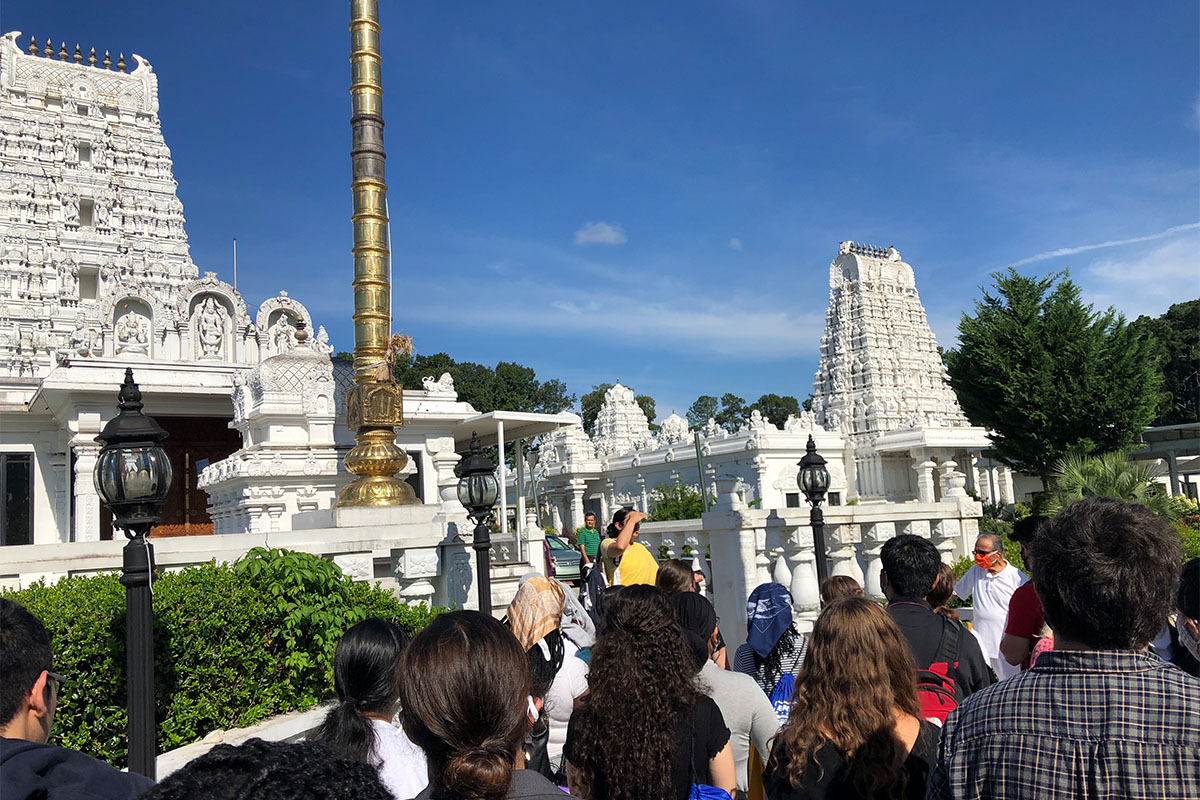
The Hindu Temple of Atlanta
Through WISE, the students jumped into discussing the “purpose of life” and started planning their spiritual and academic journeys at Emory. Other group members identified as Christian, Muslim, Jewish, Hindu, Buddhist, Sikh and unaffiliated.
“Everyone was so friendly,” Hernandez says. “Every place we went to was very open to our questions. They didn't take any offense because we were all just genuinely wanting to learn.”
“It was the unstructured conversations that were the most fun,” says Maddie Lampert, another program participant. “The other students are all such smart, unique individuals, and also driven to understand each other. It was fun to have meaningful conversations casually.”
In addition to the incoming first-year students, 12 returning undergraduate students were selected to serve as peer mentors to guide the new students in the program. These peer mentors traveled back to campus early for three days of training and to make final preparations for the arrival of the participants. The training included a visit to the Native Lands exhibit at the Atlanta History Center as well as sessions on facilitation skills, interfaith engagement, social justice education, well-being, communication styles and religious literacy.
An entry point to academics
For Lampert, who is from Atlanta and attended a Jewish school until ninth grade, WISE also aligned with her academic interests.
“I’m interested in psycholinguistics and how language affects how we view the world, and that really connects to religion,” she says. “What I wanted was to learn about cultures and people different from my own, and WISE gave me an appreciation for the moral values of each religion represented.”
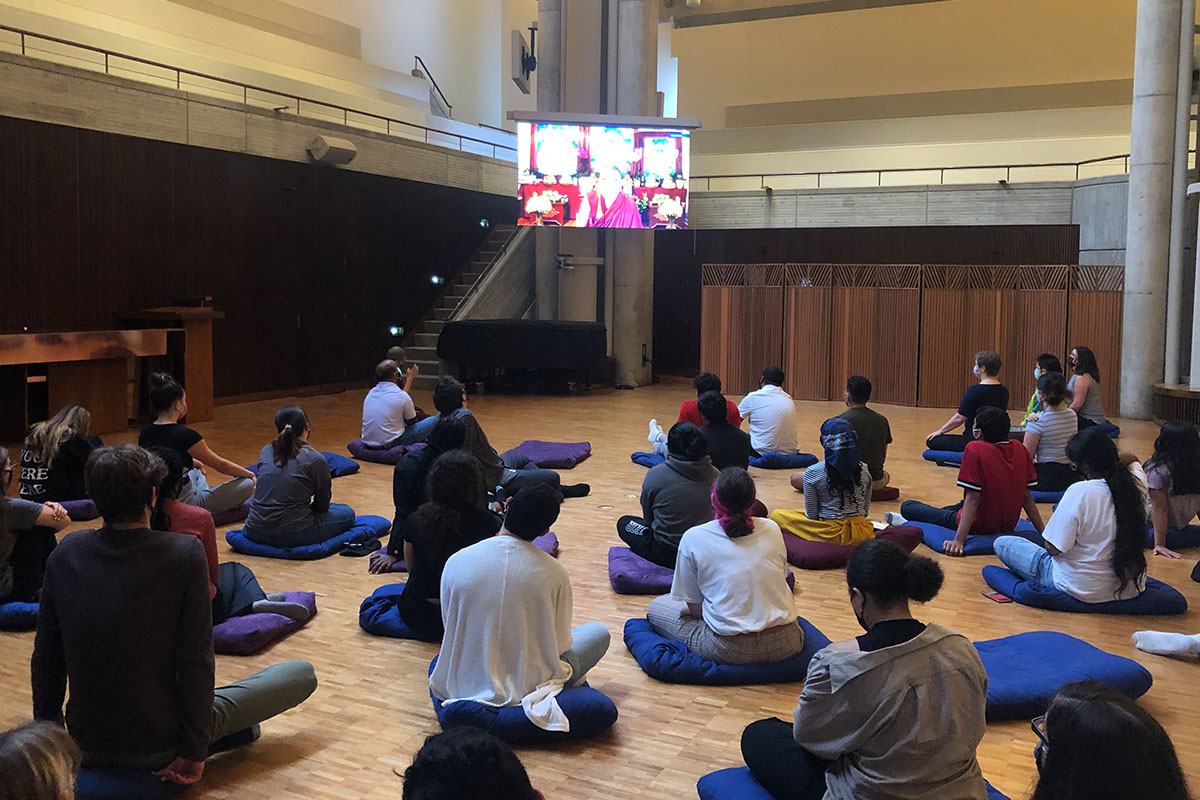
Buddhist meditation at Cannon Chapel
“When it comes to topics that may be challenging, most people tend to appreciate honesty,” Chaitanya says. “In class, we are able to speak openly about what is happening in the world today and what we think about it. It can really help students as critical thinkers to invite them into an open, exploratory space like that.”
“This is like an appetizer for the students to get an awareness of how they can go deeper in spirituality and continue doing things that are interfaith and involve social justice,” Sraman adds.
Emory’s interfaith present and future
WISE grew out of Emory’s support for a vibrant multifaith spiritual life for students, faculty and staff. Over the past three years, new chaplains have been hired across several traditions, an interfaith center is being designed, an interfaith strategic plan is underway and programs like WISE and Faith in the Vaccine have been launched.
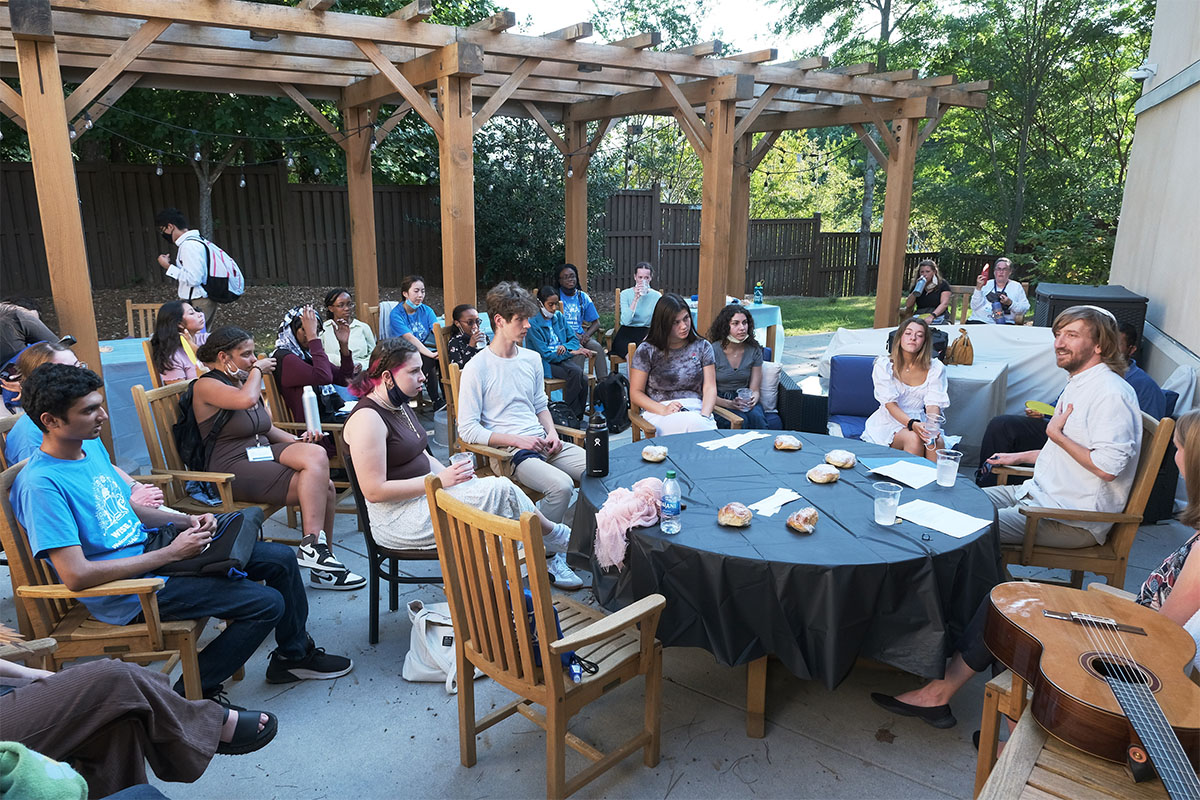
Shabbat service and dinner
“Supporting spiritual life that reflects and represents all of Emory is a critical part of our efforts to educate, honor diversity and serve humanity in today’s world,” explains The Rev. Dr. Gregory McGonigle, Emory’s university chaplain and dean of religious life. “When we educate ourselves about our differences and come to a deeper appreciation of our common values, we are better suited to address the world’s problems and build a positive community together.”
A Sikh student’s journey
One first-year student who tested that inclusiveness is Noorie Dhingra of Royersford, Pennsylvania. She had chosen Emory for its diversity and innovation but had never visited the campus before arriving as a first-year student. WISE gave her a chance to familiarize herself with her new surroundings and start making community connections.

Sikh Study Circle Gurdwara
Then she noticed with disappointment that the schedule was missing the place of worship that she as a Sikh most wanted to visit: a gurdwara. When she asked the WISE organizers if they could fit that in, they arranged for a visit to the Sikh Study Circle Gurdwara in Stone Mountain for the group, many of whom later said it was a highlight of the program.
“It felt really good to go there and be surrounded by people from a similar community, where the primary language is Punjabi,” Dhingra notes. “It felt like I was home. They were really nice and prepared a presentation to educate everyone on the Sikh faith, and then they served us a langar lunch. It definitely gave me a taste of home considering that I was in the first week of just being blown away by transitioning to college.”
Two students’ vision realized
Dhingra’s experience “is the whole point of WISE,” says one of its student co-creators, Sandra Bourdon, a human health major who will graduate from Emory College in 2023 and comes from a Pentecostal family in Warner Robins, Georgia. “When I heard Noorie talking about how glad she was to find the gurdwara here, that was a very touching moment to me.”
Bourdon and Jonna Austin, who will also graduate from Emory College in 2023, have been officers in Emory’s Voices of Inner Strength Gospel Choir and student leaders in the Beloved Community, a weekly ecumenical Protestant worship service held on Sundays at 11 a.m. in Cannon Chapel that gathered online when Emory was remote last year.
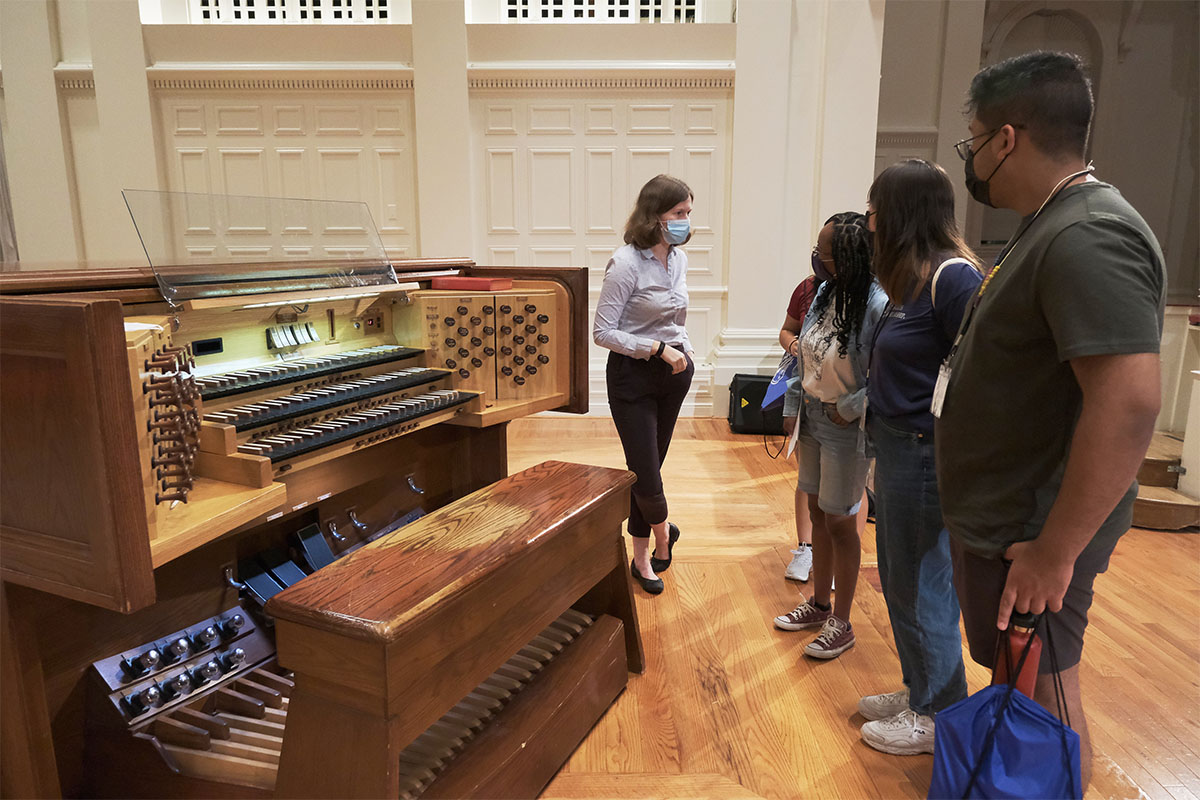
Glenn Memorial Church
The two wondered if something like the STEM Pathways pre-orientation program where they met could introduce incoming students to religious and spiritual communities at Emory and in Atlanta. “We also hoped they would have a lot of fun and make new friends like we did in the STEM Pathways,” Austin explains.
As Bourdon and Austin brainstormed a possible name for the new program, the acronym WISE stood out because of Emory’s motto: “The wise heart seeks knowledge.”
Working with OSRL starting in February 2021, they recruited peer mentors, arranged the sacred site visits and other program elements and promoted the program. As Bourdon approached the students the first day, she was worried that they might not open up.
“But they were already buzzing with chatter,” she recalls. “Instead of offering an icebreaker, I didn’t want to interrupt them.”
Zachary Cole, OSRL chief of staff, met with Austin and Bourdon nearly every week from February to August to plan the program. With support from the Candler Chaplaincy Program, they were joined in June by OSRL chaplaincy intern Liz Martin, who helped to develop the program content and logistics and to implement its first iteration. (Martin graduated May 9 from Candler School of Theology with a master of divinity degree.)
“There’s a lot of research that shows the potential of programs like WISE to be impactful channels for students to reflect on their identities and develop meaningful relationships with others from different backgrounds,” Cole says. “We hope that WISE can help students build friendships with peers with similar questions and interests before they become too immersed in their coursework and busy schedules.”
Solidifying identities
Nationally, pre-orientation programs like the five at Emory “are playing a bigger role in successfully transitioning students into the college experience,” says Jill Camper, Emory orientation and new student programs director.
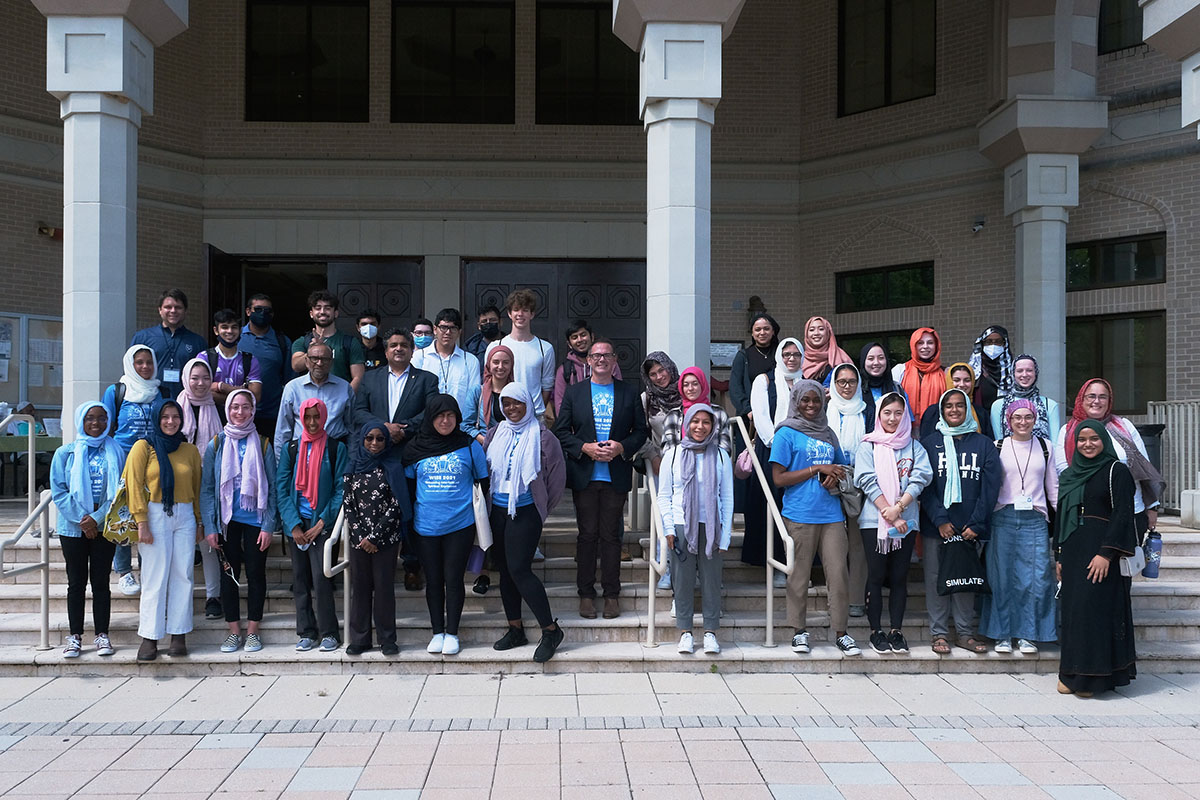
Al-Farooq Masjid
Pre-orientation meant even more for Emory’s Class of 2025 because of the pandemic.
“First-year students in fall 2021 had their entire senior year in high school online or in a hybrid format,” Camper adds. “There’s a loss that came with that, and I think these students were looking for connections they haven't been able to feel in a long time.”
Today, Dhingra is involved with the Atlanta Sikh Student Association and also joined the Emory Inter-Religious Council, which meets weekly over dinner for interfaith dialogues. She also worked with Chaitanya to obtain a harmonium for Cannon Chapel, an instrument that will allow for Sikh kirtan worship on campus.
These connections “set me up for a sense of grounding and stability in my Emory career,” Dhingra says. “And I definitely value that a lot since in the first year so much is new.”
